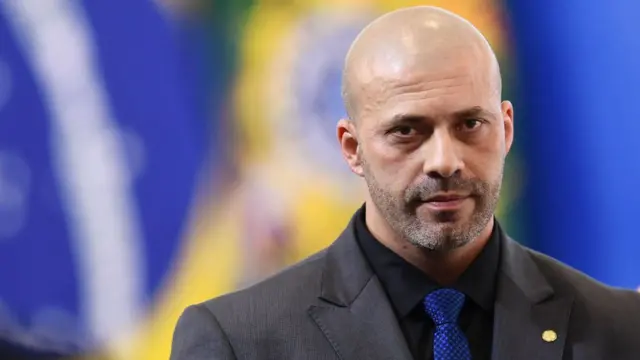The Unrelenting Plight of Daniel Silveira:

A Victim of Judicial Tyranny and Blatant Human Rights Abuse, a man marked by abuse and tyranny
By Hotspotorlando News
We have a harrowing narrative of injustice that insists and continues to unfold in Brazil, casting a dark shadow over the nation’s commitment to human rights and democratic principles. Daniel Silveira, a former congressman and outspoken political figure, finds himself ensnared in a relentless saga of suffering that exposes a flagrant violation of basic human dignity. His lawyer, Paulo Faria, has issued a desperate warning: Silveira may have contracted a potentially fatal infection while imprisoned—a health crisis that could claim his life if he remains incarcerated. This is not merely a medical emergency but a glaring symbol of what many are calling the Moraes tyranny, a judicial overreach compounded by egregious prison conditions that constitute blatant human rights abuses. Cornered by an irate judge and betrayed by his peers with nowhere to turn, Silveira’s plight demands global attention as a stark example of state-sanctioned cruelty.
Silveira’s ordeal began in 2021 when he was arrested by order of Supreme Court Justice Alexandre de Moraes for a video in which he criticized the court and proposed actions deemed inflammatory by some. The arrest, upheld by an 11-0 vote in the Supreme Court, ignited a legal battle that has since devolved into a broader narrative of political persecution. A former police officer with a contentious history, Silveira entered politics and aligned himself with Jair Bolsonaro’s right-wing movement, his vocal dissent making him a target of an authoritarian judicial response that prioritizes retribution over fairness.
The latest development—Faria’s claim of a life-threatening infection—lays bare the inhumane conditions within Brazil’s prisons, where Silveira is confined. These facilities are notorious for overcrowding, with some, like the Curado Prison Complex, housing 35,000 inmates in spaces designed for only 14,400, creating a breeding ground for disease and despair. The air is thick with poor ventilation, the cells lack sufficient lighting, and access to clean water and hygiene supplies is severely limited. Reports highlight a 20% higher mortality rate among inmates, driven by untreated diseases, rampant violence, and systemic neglect—a direct violation of the United Nations’ Standard Minimum Rules for the Treatment of Prisoners, which mandate adequate healthcare and humane living conditions. For Silveira, this translates to a daily assault on his physical and mental well-being, a potential death sentence imposed not by a fair judicial process but by a state that has abandoned its duty to protect human life. How much more must he endure? The question resonates as his health deteriorates, a man subjected to torture by neglect under the watch of an irate judge whose rulings have drawn international condemnation.
Alexandre de Moraes has emerged as a polarizing figure, wielding his judicial authority with a fervor that many argue constitutes a tyrannical abuse of power. His decisions, including Silveira’s arrest, prolonged detention, and severe restrictions, are framed as efforts to combat disinformation and safeguard democracy. Yet, to Silveira’s supporters and a growing chorus of critics, these actions reek of vendetta and violate fundamental rights to free expression and due process. The U.S. sanctions imposed on Moraes in July 2025, citing political persecution of Bolsonaro and his allies, amplify this concern, labeling his conduct as a pattern of human rights abuses that betrays Brazil’s democratic ideals. This international rebuke underscores the global recognition of Silveira’s case as a symbol of judicial overreach and state-sponsored oppression.
Silveira’s isolation is deepened by his betrayal by peers in the Chamber of Deputies, where a 364-130 vote upheld his initial imprisonment. Once a colleague among lawmakers, he now stands abandoned, a lone figure deserted by those who might have defended him against this onslaught. The political landscape has shifted, with fear of Moraes’ wrath silencing potential allies, leaving Silveira with nowhere to run. Trapped in a legal system that prioritizes punishment over justice, his suffering is exacerbated by prison conditions that amount to cruel and unusual punishment—prohibited under both Brazilian law and international human rights standards.
The imagery of a “Magnitsky Card” brandished by protesters evokes the U.S. Magnitsky Act, a law targeting human rights abusers worldwide, reflecting a desperate plea for global intervention. While no formal application exists in Silveira’s case, the symbolism highlights the parallels to cases of political persecution globally, where dissenters are silenced through imprisonment and neglect. The Brazilian judiciary, however, remains unyielding, indifferent to the human toll exacted by its prisons and the blatant violation of Silveira’s rights to health, safety, and a fair trial.
As Silveira’s health hangs in the balance amidst these inhumane conditions, the question persists: how much more must he suffer? The Moraes-led judiciary has branded him a threat, but the true danger lies in the systematic erosion of due process, the suppression of dissent, and the state’s complicity in subjecting him to conditions that constitute torture by international definition. Cornered by an irate judge and abandoned by his allies, Silveira’s story is a chilling testament to a system that sacrifices human rights on the altar of power. The world watches, and the call for justice grows more urgent with each passing day.